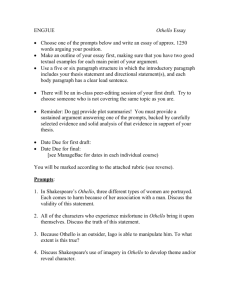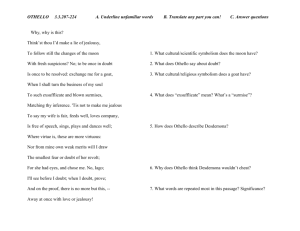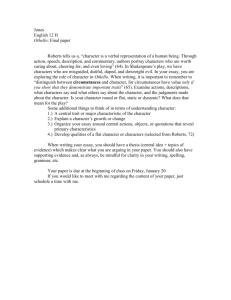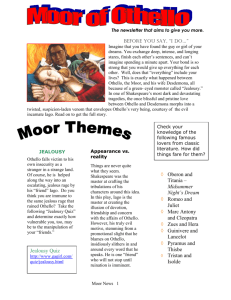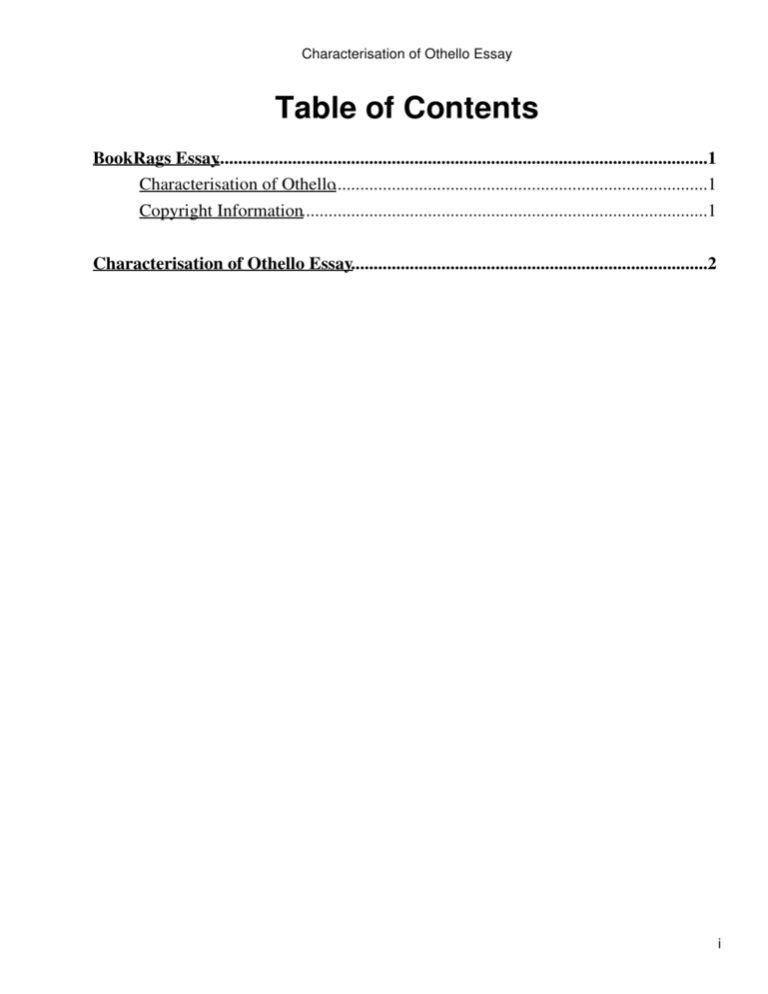
Characterisation of Othello Essay
Table of Contents
BookRags Essay.............................................................................................................1
Characterisation of Othello...................................................................................1
Copyright Information..........................................................................................1
Characterisation of Othello Essay...............................................................................2
i
BookRags Essay
Characterisation of Othello
For the online version of Characterisation of Othello Essay, including complete
copyright information, please visit:
http://www.bookrags.com/essay-2005/6/3/203331/2812/
Copyright Information
(c)2000-2006 BookRags, Inc. ALL RIGHTS RESERVED.
BookRags Essay
1
Characterisation of Othello Essay
Othello
Othello is first introduced in the opening dialogue between Roderigo, Iago and
Brabantio. His name is not used and he is referred to as `the Moor', `the thick lips' `the
old black ram', `the devil', `Barbary Horse' and `lascivious Moor'. Iago describes him
as `horribly stuffed with epithets of war' and `loving his own pride and purposes'.
From these descriptions, the responder immediately understands that none of these
characters like Othello. The extreme bias of their opinions has the effect of making the
responder question them, and not immediately assume Othello is as he is described.
In addition to the derogatory statements made, Iago grudgingly praises Othello, further
heightening the sense that Othello may not be as Iago sees him. Iago says `the state
cannot with safety cast him' and even admits that `another of his fathom they have
none'. Shakespeare uses a character who plainly does not like Othello to praise him,
which appears to suggest that without a doubt Othello does have some good qualities
as even his enemies can see them.
Soon after his suspenseful and contradictory introduction by Iago, Roderigo and
Brabantio, Othello himself appears on the stage. Suspicions about the accuracy of
Iago's criticisms are immediately confirmed, as Othello appears as articulate,
intelligent, dignified and commanding.
The first knowledge we gain of him is that he is an army general and that he loves a
woman named Desdemona, a Venetian. These are the two most important things about
him and constitute much of the play's action.
His first actions involve skilfully avoiding a violent conflict with words and
convincing the Duke of Venice and his men that he is truly and innocently in love with
Desdemona in a very flowery and ornate speech.
Characterisation of Othello Essay
2
Characterisation of Othello Essay
However, from underneath all his poetic language, politeness and charm emerge
occasionally subtle hints of Othello's flaws. It appears that he is somewhat arrogant
and bombastic as Iago argued. He states that `My services which I have done his
signiory/Shall out tongue his complaints' and in the impression created is that he
believes nothing can bring him down.
His long speech about loving Desdemona is important as it tells the responder that
Othello's life up until now has been almost exclusively centred on being a warrior. He
has very little understanding of human nature and society. Othello realises that he does
not understand society, and is very open about this, saying `Rude am I in my speech'
and making other comments throughout about his lack of culture. However he does
not realise that he does not understand human nature, including his own nature. This is
shown through him making statements about himself such as that he will not be
distracted from his duties by her. He also trusts the wrong people - he entirely trusts
Iago, but easily doubts Cassio. However, the indications of flaws in Othello's character
are very subtle and slight at this stage and the impression created is overwhelmingly
positive and admirational.
Act 2
Othello and Desdemona's marriage is blossoming and they are completely besotted
with each other. Othello has military success and is praised ever more highly. In
contrast to these scenes of happiness and love, Iago delivers soliloquies informing us
of his intentions and fuelling his hatred. Suspense is created as it becomes apparent
that Othello is going to be destroyed. This suspense is heightened by Othello making
highly ironic statements such as `I will be happy if I die now'.
Iago begins to play a more important part as he outlines and begins to implement his
plan for Othello's destruction. This involves getting Cassio drunk and into a brawl.
Othello is in charge of this, and we first see how he carries out his justice. Upon
hearing one side of the story - Iago's - Othello immediately fires Cassio. Othello is
shown to have very swift, irreversible and strict justice, and to have no sense of
Characterisation of Othello Essay
3
Characterisation of Othello Essay
needing the opinions of others in determining his justice.
Act 3
After Cassio has been fired, Iago begins the next stage of his plan. He advises Cassio
to approach Desdemona to plead his case before Othello. At the same time, he is
feeding Othello information and hints that Cassio and Desdemona are having an affair.
Othello responds very quickly to Iago's poison. All Iago needs to do is say a few half
sentences and give some vague answers, and Othello is becoming very suspicious and
jealous. However, he does try to convince himself that he is not jealous or suspicious
and is still in love with Desdemona.
His insecurities - over his age, colour and lack of culture - begin to figure very
strongly in his mind. Iago also plays very cleverly on these insecurities, presenting
them as reasons for Desdemona's supposed unfaithfulness. Iago also plays upon
Othello's lack of knowledge of Venetian society. Othello is falling deeper and deeper
into the trap of jealousy - without realising that he is becoming jealous at all. His
language becomes like Iago's -he begins to use bestial imagery.
Othello's downfall is emphasised through the degeneration of his language. He is now
using extremely distasteful language to describe Desdemona - bestial imagery, disease
imagery, whore imagery. Othello still does not think for a moment that he has fallen
into any trap or that he is at all controlled by Iago. He does not confront Desdemona,
or discuss his suspicions with anyone else. He accepts Iago's claims without sufficient
questioning. This illustrates his lack of understanding of human nature and in
particular the application of justice.
Othello begins to suffer extreme anguish and mental torment. He cries `Why did I
marry"' pg 113. He states that he wishes he had never `discovered' Desdemona's
`infidelity' - that he wouldn't care if the whole world were sleeping with her as long as
he didn't know. Although the responder is fully aware of Othello's complete
misunderstanding of the situation, his pain in these scenes invokes a great deal of pity.
Characterisation of Othello Essay
4
Characterisation of Othello Essay
(pg 121)
Iago begins to to present `proof'. Othello's immediate and utter acceptance of
everything Iago says highlights exactly how entire Iago's control over Othello is at this
point. Othello begins to think of taking action - we understand that he is not the kind
of character who can just bear pain and perceived injustice - he feels that he must take
action. He declares of Desdemona `I'll tear her all to pieces' pg 125. He swears that he
will get his revenge.
Even while swearing that he will be revenged, he acknowledges that he still loves
Desdemona. He loves and hates Desdemona and this adds to his torment. His
contradictory feelings and confusion are exhibited by his constant use of oxymorons
such as `the fair devil'.
For the first time, Othello discusses his beliefs with Desdemona, but he does not
actually ask or state anything, he merely implies that he is unhappy with her. His
continuing avoidance of actual confrontation suggests a belief that if he thinks it, it
must be true and he does not need to consult others.
Desdemona is unable to present the handkerchief Othello gave her (pg 135)(as Iago
has stolen it) and Othello assumes this as proof of her guilt.
Iago is relentless in his destruction of Othello and continues to feed him more poison.
Othello's speech descends further from unpleasantry and hatred into incoherence. He
even suffers physically - having a fit pg 147.
On pg 157 Othello decides how he will murder Desdemona. Iago suggests strangling
her in her own bed and Othello immediately warms to this idea, saying `the justice of
it pleases me'. This statements exemplifies Othello's belief that he is behaving and
acting only as is just, and is not affected in any way by jealousy.
Characterisation of Othello Essay
5
Characterisation of Othello Essay
Also on pg 157. Desdemona's society visits. This is a break from the chaos and
turmoil of the other characters and a reminder of the life Desdemona should have led.
During the meeting Othello hits Desdemona. His belief in her guilt is firming,
demonstrated by his increasing willingness to almost confront her. The change in
Othello since the beginning of the play is emphasised through characters who have not
seen him change gradually witness his destruction.
The Venetians have come to tell Othello that he is posted back to Venice and Cassio is
to take his place. This infuriates Othello further, as he sees it as proof of Cassio's
malice towards him.
In Act 4, Scene 2 (pg 161) Othello first discusses his suspicions with another
character. The fact that this occurs so late in the complication indicates his certainty of
his own rightness. He confronts Emilia with his suspicions and she rejects them
entirely. Othello's subsequent dismissal of her assertion displays his complete
corruption and irrational conviction as to Desdemona's guilt.
Othello then hints at his suspicions to Desdemona, but does not actually confront her.
Desdemona's innocence is highlighted by her complete lack of understanding as to
what Othello is talking about. She denies being a slut, and Othello again proves his
unwavering conviction by disbelieving her.
In Act 4 Scene 3, Othello orders Desdemona to bed where he kills her violently. After
realising his mistake, he is destroyed and takes his own life.
Characterisation of Othello Essay
6



